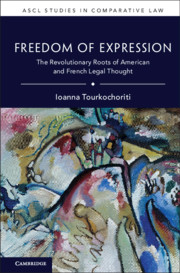Book contents
- Freedom of Expression
- ASCL Studies in Comparative Law
- Freedom of Expression
- Copyright page
- Contents
- Acknowledgments
- 1 Introduction
- 2 Antiquity, Modernity, and Historical Imaginaries on the Role of the Government
- 3 The Underlying Ex Ante Understanding of Liberty
- 4 The Moralizing Rational Republic versus the State Arbitrator of the Free Play of Interests
- 5 Foundation of the Rights of Man on the Rights of the Citizen versus Foundation of the Rights of the Citizen on the Rights of Man
- 6 Conclusion
- Bibliography
- Index
1 - Introduction
Speech, Privacy, and Dignity in France and the United States
Published online by Cambridge University Press: 29 October 2021
- Freedom of Expression
- ASCL Studies in Comparative Law
- Freedom of Expression
- Copyright page
- Contents
- Acknowledgments
- 1 Introduction
- 2 Antiquity, Modernity, and Historical Imaginaries on the Role of the Government
- 3 The Underlying Ex Ante Understanding of Liberty
- 4 The Moralizing Rational Republic versus the State Arbitrator of the Free Play of Interests
- 5 Foundation of the Rights of Man on the Rights of the Citizen versus Foundation of the Rights of the Citizen on the Rights of Man
- 6 Conclusion
- Bibliography
- Index
Summary
This chapter discusses the importance of freedom of speech in reference to Enlightenment thinkers, among others. It analyzes deontological and consequentialist defenses of this freedom in order to provoke a reflection on its legitimate limits. Then, it presents cases in the United States where reference to human dignity serves to justify a protective conception of freedom of expression and cases in France where reference to the same concept serves e to justify limitations of the same liberty. The argument in this book builds off Hans-Georg Gadamer’s analysis of legal hermeneutics. According to this analysis, anticipations of meaning condition the receptivity of a reader of a text. The ex ante understanding of the role of the government present in jurists in France and the United States affects their understanding of the legitimate limits to freedom of expression. The difference in the approach indicates a difference with regard to the “imaginary institution” of the political phenomenon on each side of the Atlantic.
Information
- Type
- Chapter
- Information
- Freedom of ExpressionThe Revolutionary Roots of American and French Legal Thought, pp. 1 - 33Publisher: Cambridge University PressPrint publication year: 2021
